The Ultimate Guide to Blogging Quality vs Quantity
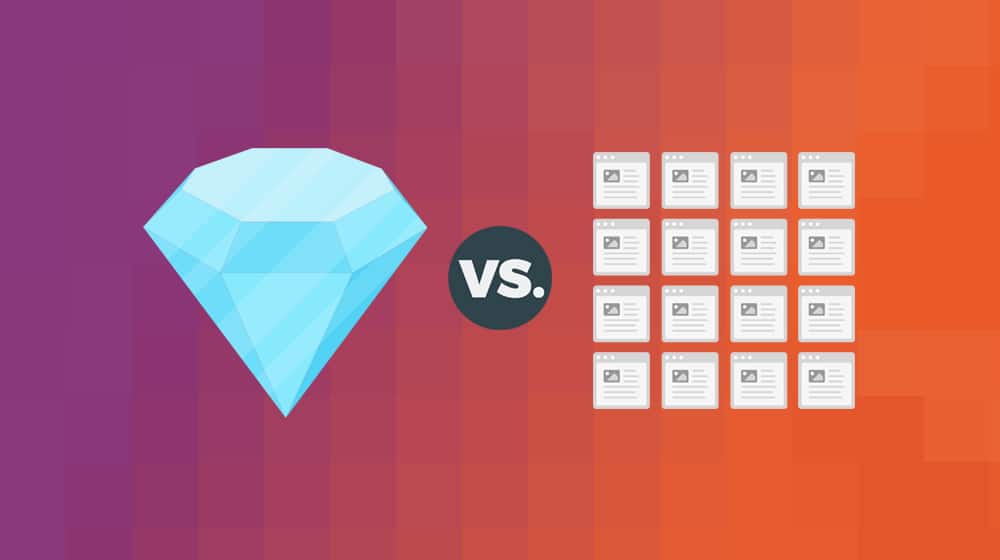
There is and shall forever be a debate between quality and quantity. They're two factors that are tied together, and which you must balance to find true success in blogging. Which is more important, though, and where should you draw the line?
Which is Better?
The first question you might ask is simple: which is better, a single high-quality blog post or a bunch of shorter, lower-quality posts?
The answer, though, isn't as simple.
One high-quality blog post has the potential to rise to extreme heights. These posts can become huge, evergreen resources linked to by thousands of great domains and can become a core pillar of your entire site's value.
On the other hand, that single long post could take you weeks to put together, and the ongoing maintenance it requires to keep it up to date and relevant can eat up hours throughout the following years. That's a lot of effort to put into a piece of content, and you have no guarantee that it's actually going to do well. Thousands of blogs create huge, excellent blog posts that just go nowhere.
There are a lot of other content marketing factors at play (maybe the topics were too competitive, or had no traffic), and that just adds to the confusion. This is something bloggers have debated and argued about for decades. More on that later in the article.
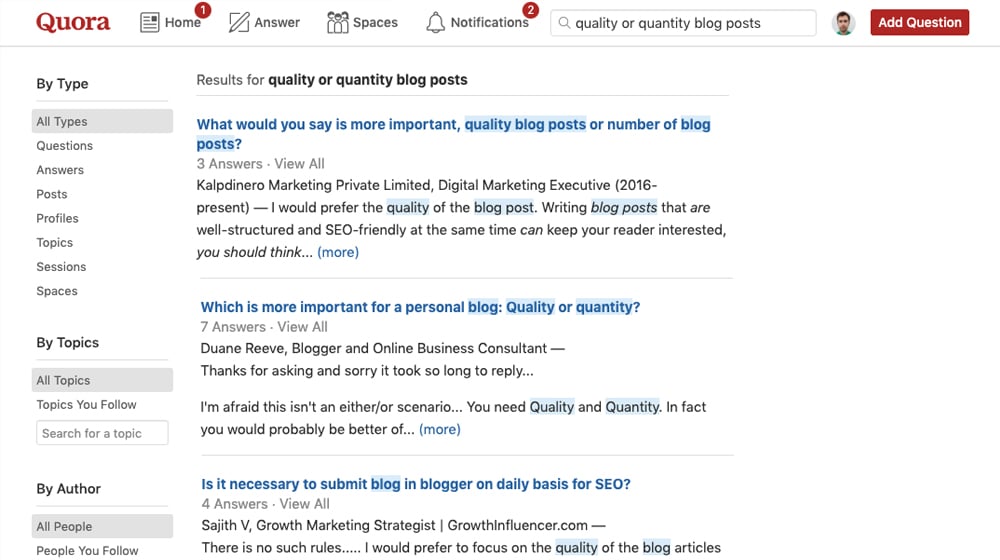
To flip the coin, producing a handful of smaller, shorter blog posts has the potential benefit of being more consistently useful to your site. They don't take very much time to produce, and they can do well without having to become massive industry juggernauts of powerful information. Every single post you publish is an opportunity to go viral, to get good links, and to rank for different keywords as well.
On the other hand, none of those posts are likely to do extremely well unless you have a very unique reason for them to do so. For example, the famous Matt Cutts blog post about the end of guest blogging isn't actually very long and wouldn't normally be considered a piece of pillar content. However, since it was coming from an important authority in SEO at the time and concerned a major change in marketing, that post has been linked to about a trillion times, has nearly 700 comments, and has provided endless value.
Of course, Matt's blog isn't something he's marketing or growing, it's just a personal blog, so he doesn't really care about the performance of those posts. He has other things to worry about. Heck, he only posted on it once in all of 2019.
As I've said before, and as I'll say again, it's all about striking a balance. So what happens when that balance is upended?
When Quantity Goes Bad
Quantity of blog posts is tricky because you don't want to post too little, but you also don't want to post too much. You have to stay somewhere in the middle.
Posting too little is a pretty obvious flaw. If you're only posting once a month, once a quarter, or once a year, you don't really build much with your blog. It doesn't even really matter how high-quality that blog post is; the small size of your site and your overall lack of content makes it a poor choice for Google to recommend.
Remember that your site wants to rank for a bunch of different keywords, and you can't really do that with a single blog post, you need multiple posts. Every post is a new set of keywords you can rank for, so the fewer posts you publish, the fewer queries you can show up in.
Sure, there are successful blogs that only publish once a month or so, but those are exceptions to the rule. They're successful not because of their content, but for other reasons. If someone like Neil Patel decided to only publish a post once a month, he would certainly still be relevant, but he might not be as widespread as he is now.
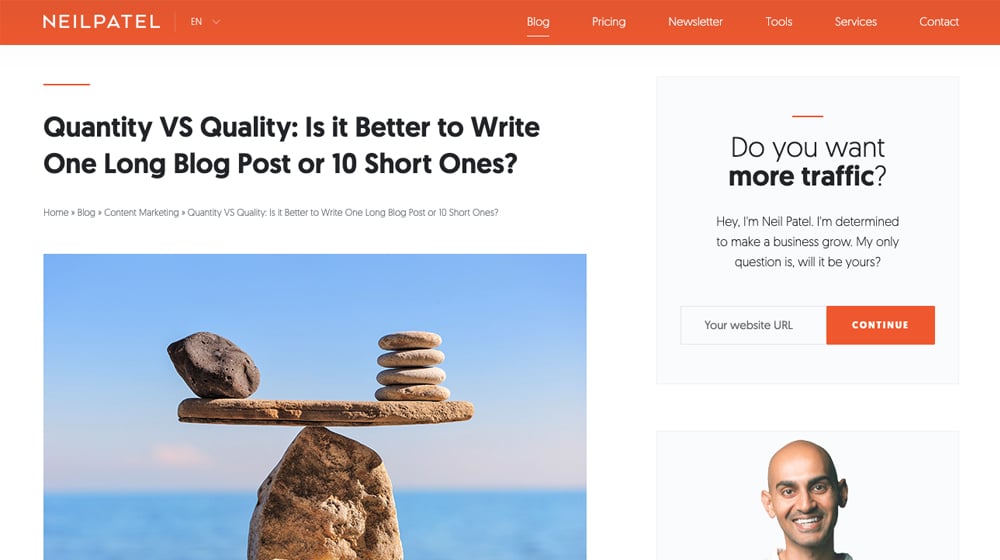
Conversely, publishing new content much more often has some definite drawbacks. People who read your blog like to keep up with the content you publish. A lot of people have an inherent human desire to complete what they're reading, so reading every post you publish becomes a drive for them. By publishing more frequently than they can read, they have to give up on that goal, and that feels bad.
You also run two defined risks. First, you might come across as spammy. Publishing far too often, even if all that content is unique and decent in quality, might just make people feel like you're using some kind of spinner or scraper to do the work for you. They grow suspicious of your sources, especially if you publish everything under one name or a general "site admin" account banner.
The other risk is that you simply don't have time for anything else. It can take quite a while to actually write a blog post from start to finish, and even longer if you're trying to put attention and care into your keyword choice. You end up spending more time writing (or managing writers) than you do growing your business in other ways. There are diminishing returns.

And yes, there are lots of sites that publish way more frequently than they probably should. There was a time, years ago, where I wrote a new blog post every single day. When I decided that was too much, and I focused on one higher-quality post per week, I saw immediate growth. Not all of them can be winners.
If you have a phenomenal amount of resources on hand, you can kind of brute force success with the sheer quantity of your content. Even if only 2% of your blog posts are winners, if you're publishing thousands of posts per day, that's still quite a lot of good posts circulating.
The Huffington Post did this when they first started out. In order to hit the big time as quickly as possible, they published nearly 2,000 posts per day, averaging about one a minute. They could do this because they had a ton of money to attract a ton of writers to write on a ton of different topics.
For a smaller one-man operation or a small team, the idea of writing more than a couple of posts per day is insane. There's not enough time in the day. It's not a strategy anyone can pull off; it's only available to you if you can bankroll it.
When Quality Goes Bad
Now let's look at the other axis: quality. You might think that quality is only one way; the higher quality a post is, the better it will be. You're correct, mostly, but there are actually diminishing returns.
Obviously, lower-quality posts simply don't work. Short, low quality, poorly written or unhelpful posts are automatically suppressed by Google, so you have to meet at least the bare-minimum quality thresholds.
What are those thresholds? It's hard to put into words because "quality" isn't really something that can be easily defined. In technical terms, you want posts to be at least around 1,500 words long, but also you need the post to have particular elements to it, like:
- Flow. A post should start with a question, lead through reasoning and evidence, and end with a conclusion and rationale.
- Uniqueness. A post should have something unique about it that sets it apart from the competition.
- Formatting. A good blog post these days includes plenty of formatting, including bolding, subheadings, paragraph breaks, and lists, to break up and make content more interesting to read.
- Value. A good blog post isn't written just to be words on a page, it's written to deliver some kind of value to the reader. What is the purpose of the post, and are you succeeding with that purpose?
- Surroundings. A post needs to be "dolled up" to work well. That means everything from well-crafted metadata to images with captions in the post and more.
All of these are elements of quality, and you can bet Google's semantic parsing engines and machine learning algorithms (not to mention their human evaluators) take all of this into account. It's not really something you can quantify, but it's all stuff that goes into an overall analysis of quality.
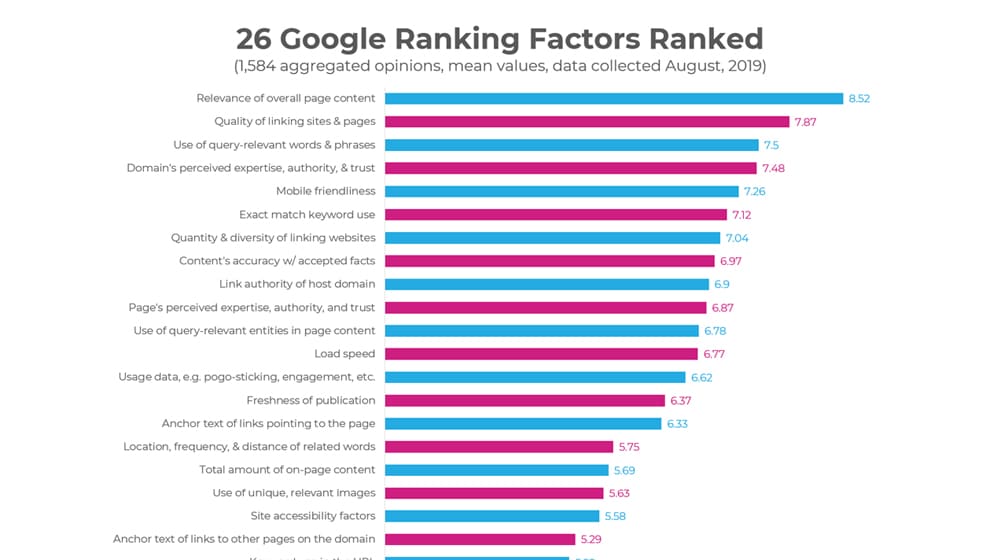
So what happens if you put too much emphasis on quality?
Basically, you can hit diminishing returns. It's a matter of time spent versus value gained. You can spend an extra three hours on finding just the right specific links to add to your posts, or a full day creating custom artwork for your imagery, or a week researching specific keywords you can use in perfectly natural ways throughout the post to get the best possible ranking.
Meanwhile, someone else could do 1/4th that amount of work on writing a moderately high-quality post, and then write three more of them in the same amount of time. You might rank #1 for one query, but they rank #2 for four queries. They end up with more name recognition, more traffic, more links, and more value.
The Third Element: Consistency
While you have to struggle to balance the scales between quality and quantity, there's a third factor at play, and that is consistency. Your content needs to be consistent above all else.
Consistency is a modifier for both quality and quantity. For quality, you need to maintain a consistent level of value in your posts. If one post is 2,000 words of fluffy garbage and another post is 1,200 words of decent content, people will be turned off by one and won't be hooked by the other.
This is, incidentally, why I try to aim for a particular target word count for all of my posts. I find that striving to reach a particular word count (or to constrain myself to that word count) keeps quality roughly consistent. I try to choose topics that aren't so complex I'd need to write a book about them, and I try to choose topics that aren't so simple that I'd need a lot of tertiary fluff to cover them in 2,000 words.
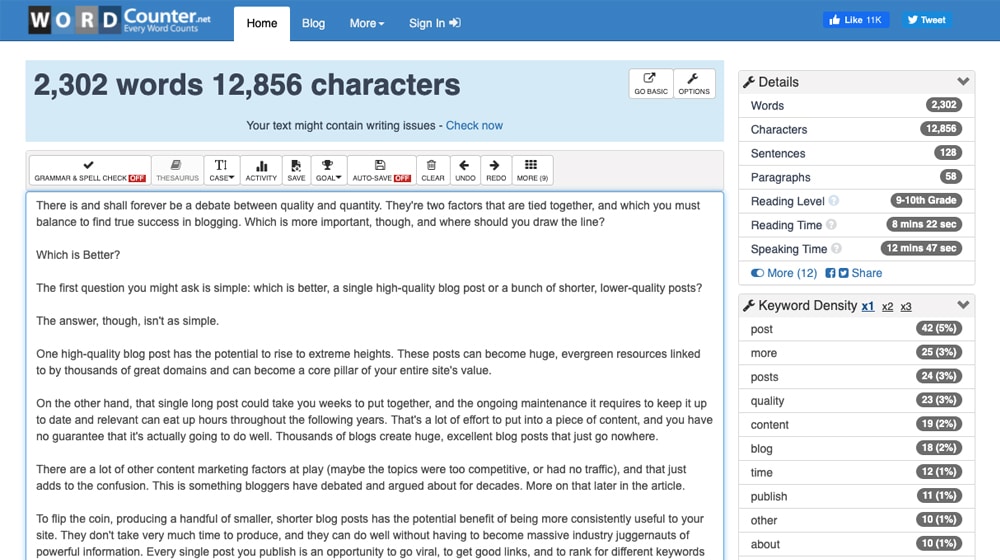
Consistency is also crucial for quantity, but it's more in terms of scheduling than quantity itself. If you're publishing more than about three times per day, it doesn't really matter how many more times per day; people are just going to know there's new content every time they visit, and that's good enough. If you're publishing once a day or less, maintaining a consistent schedule is important.
A consistent schedule tells people when they should check your site to get new content, and ensures that you always have that new content for them when they arrive. If your schedule is variable, people don't build a habit of checking, and they eventually just stop.
What Should You Do?
So, how do you balance the scales? What should you do?
The answer is: as much as you can.
HubSpot has performed several studies and has found that there's not really a cap to how often you can post, so long as you keep it consistent. More posts mean more opportunities and more links. The few people you lose by posting too often are replaced by people who wouldn't have found you without a particular piece of content you wouldn't have published otherwise.
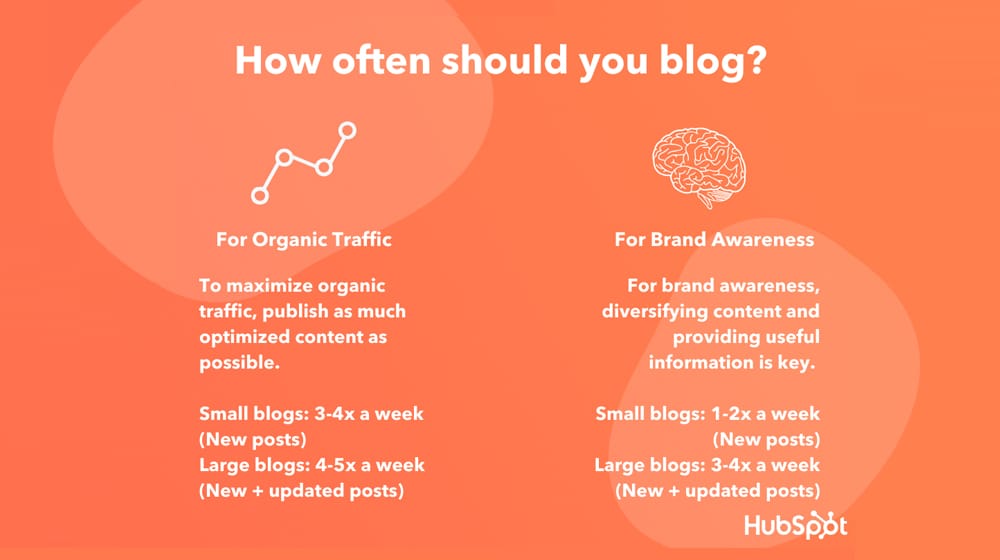
So: post as often as you can while maintaining quality. If your quality suffers because you're trying to post more often, you need to dial it back.
Personally, I think you should focus on quality first. Develop high-quality content on a regular basis, and figure out how long it takes you to produce on average. Determine a schedule based on that. If you take two days to write a high-quality blog post, you shouldn't post more than once every two days, or you'll let your quality suffer or you'll burn out.
You can, to a certain extent, supplement this with money. If you want to post more often, spend money to hire writers to produce content for you. You can do this with ghostwriting and maintain it all under your name (though you shouldn't post so often that it's not believably you), or you can do it by hiring writers with their own bylines.
You can also try out a variable plan. For example, Zenpost offers a sample schedule where a larger 2,000-word post is published every two weeks, and every week you published a 1,000-word post and a 600-word post on other subjects.
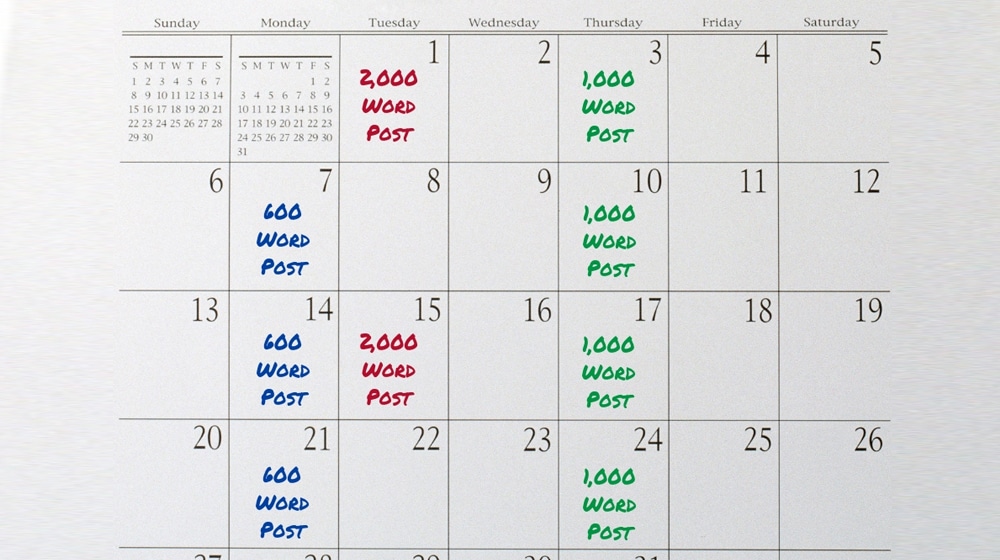
I don't personally like this exact plan, because I figure a 600-word post is too short to be considered high-quality. However, you could set up a plan where you publish two 1,500-word posts every week, and every two weeks you publish a longer 2,500-3,000-word post as a deeper dive into great content, or even a once-a-month 5,000-word mega-post you spend quite a bit of time working on.
This is what I mean when I say that quality and quantity are not necessarily reflections or opposites on a scale. You can play around with them, do different things, and figure out what balance works best for your site.
As you grow, so too can grow your posting schedule. Taking on more writers to fill out gaps until you're publishing daily, and increase quality until you're shifting those 1,500-word posts into 2,000-word posts, and so on. Our research study that analyzed over 28,000 high ranking blog posts shows that the average blog post word count is in the 1200-1300 word range, so you want to aim to meet (or, ideally, exceed) that to compete.
Just remember:
- Don't spend so much time polishing your writing that it's no longer the expenditure.
- Don't plan to publish so frequently that your quality suffers for it.
- Don't try to take on so much that you burn yourself out.
If you can keep those tips in mind when you're planning, writing, and publishing, you will strike a strong balance between these two.










January 18, 2021
Thanks for this guide. I am pro-quality so what I am doing is I post one article per month of around 2,000-2,500 words, sometimes more (depends on the subject). This year my target is one article per week with 1,500-2,000 words.
January 22, 2021
Hey Oman! Thanks for sharing.
That's a great goal - if you don't mind me asking, why the drop this year in word count?
The average word count of articles is in the realm of 1300-1400 words, and most articles above 2,000 words tend to compete in the top positions.
The way I see it, it's hard to compete if you're doing what everyone else is doing - you have to one-up them somehow.
Food for thought, keep up the good work!
April 20, 2021
Hey James. I am really busy and still don't have the budget to get someone to take care of my blog so I am wondering if I should start with every other week with 1500 words per article? It's a new business and the purpose of my blog is for brand awareness
April 22, 2021
Hi Evelyn! I sent you an email, I think I can help you out or point you in the right direction 🙂
June 30, 2021
Another stellar guide.
You brought up a good point that doing what's "average" isn't going to help you compete with anyone.
If everyone is doing 1,000 words then I'm going to do 2,000 words!
June 30, 2021
Hey Sharon! I think you're onto something 🙂
Thanks for the kind words.
December 03, 2021
Such an informative guide. I know the feeling of taking on more than I can handle all too well... It's really difficult to find the balance especially since I'm just starting.
December 03, 2021
Hey Jim!
Keep at it! It's easier to find balance, too, when you reduce the number of your blog posts and improve the quality and impact.
Brian Dean at Backlinko is an extreme example.
He only publishes a new blog post every month or two, but those are expertly researched and optimized skyscraper posts with a huge impact.
One post per week is a great place for most bloggers to start, focusing on making those posts better than any of the competitors.
Good luck!
December 23, 2021
Fantastic guide. Thanks for sharing. Finding the right balance really is the key here and once you do, it starts to feel second nature to you.
December 31, 2021
Thanks Tim! Happy new year!